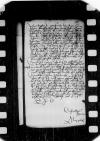List #1973
Mathias PLATEN do Ioannes DANTISCUSGdańsk (Danzig), 1538-11-07
| odebrano 1538-11-12 Rękopiśmienne podstawy źródłowe:
| ||||
Tekst + aparat krytyczny + komentarz Zwykły tekst Tekst + komentarz Tekst + aparat krytyczny
Dem hochwirdigst(en) in Gott fursten unde hern, hernn
Hochwyrdigster in Gott Furste, Genediger Herre, meyne berethwyllig(en) stete dynst(en) szeynt Ewer(r) Furstlichen Gonod(en) zcuvorann(n) boreth unde bepholenn(n).
Genediger Herre.
Why my(r) E(wer) F(urstlichen) G(enoden) von dem allekanth cf.
Genediger Herre, why E(wer) F(urstlichen) G(enoden) cf.
Genediger Herre, ich bedanck(en) mich ffru(n)tlich, das E(wer) F(urstlichen) G(enoden) mich gerne geszeen hett(en) zcu E(wer) F(urstlichen) G(enoden)
Hyrmytthe thu ich Ewer Furstliche(n) Genod(en) dem almechtig(en) Got(e) befhelenn(n).
Dat(um)
E(wer) F(urstlichen) G(enoden) guthwylliger(r) dyner


 BCz, 1597, p. 214
BCz, 1597, p. 214